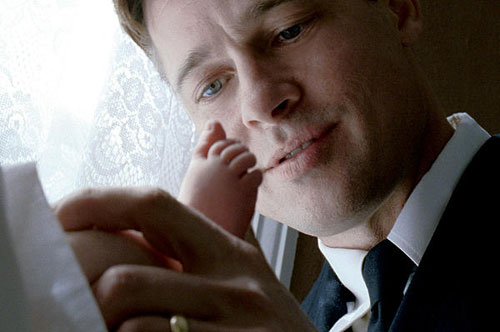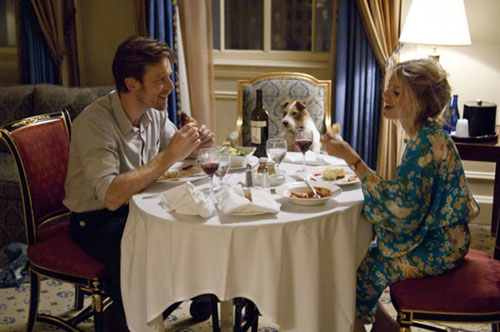|
Terrence Malick's The Tree of Life won this year's Palme d'Or at Cannes. The Palme d'Or, like the Best Picture Oscar, has never been a guarantee of high quality in a film (Bob Roberts and Wild at Heart prove this beyond doubt), and The Tree of Life was a controversial choice for the prize. Personally, I am still sorting out my feelings about the film, more than a month after I saw it.
I have never adhered to the cult of Malick, a legendarily elusive director who has made only five films in 38 years, but I like his work. The flowing, dreamlike images of such films as Badlands, Days of Heaven and The Thin Red Line capture a home truth about existence that other films generally have not: that our lives are comprised for the most part of impressions, not incidents, and it is the general ambience of where we live, more even than what happens to us, that shapes our characters. The landscapes in Malick's films dwarf the actors, and that observation sums up Malick's philosophy as well as anything.
 |
With The Tree of Life, however, Malick attempts a giant leap beyond his previous work. Taking an epigraph from the Book of Job, Malick tackles the entire question of human existence—our place in the Universe, the problem of pain, whether the soul survives the death of the body. He packs the main story—a semi-autobiographical tale of a middle-class family in a small Texas town in the 1950s—within an elaborate swaddling of bravura photography (by Emmanuel Lubezki) depicting the cosmos in all its aspects, from interplanetary space to a kaleidoscopic view of microorganisms. He even includes a sequence dramatizing the first time a dinosaur recognizes an injured cohort as an individual, rather than as lunch. It's reminiscent of Kubrick and 2001, except that for Kubrick the search for meaning began and ended with science. Malick seeks to delineate the spiritual side of human life, the existence of which Kubrick denied. (The resemblance between The Tree of Life and 2001 is no accident; Douglas Trumbull, the legendary special effects artist, worked on both films.)
The central character of The Tree of Life is Jack, played as a boy by Hunter McCracken and as a man by Sean Penn. Throughout his life, Jack finds himself beset by an overwhelming choice: between the Way of Nature, as exemplified by his father (Brad Pitt), and the Way of Grace, as embodied by his mother (Jessica Chastain). The Way of Nature seeks to conquer and dominate; the Way of Grace is endlessly loving, giving, accepting. Early in the film, the death of one of Jack's younger brothers forces Jack to review his life and wonder which way he has truly followed.
Here as in his other films, Malick is stronger on impressions than on specifics. In places this pays major dividends: the scenes depicting Jack's infancy and early childhood have a tender universality and Proustian intensity that brought tears to my eyes. Generally speaking, the scenes of Jack's family life sustain that intensity. Jack sees his mother as an ethereal, angelic being; at one point she's even shown dancing in mid-air. His father, on the other hand, is hard and capricious, demanding that his sons learn how to box, banishing them from the dinner table for imagined infractions. Malick depicts the father as talented both mechanically and musically, a man continually disappointed that his talents go unrecognized, who asserts within his family the domination the world denies him.
 |
Jack grows to adolescence amid these family tensions, confused by emotions he doesn't understand. He bullies his younger brothers; he is cruel to animals; seeing his father working under the jacked-up family car, he imagines for a moment what it would be like if he kicked over the jack. The scenes of Jack's sexual awakening include a sequence in which he prowls through a neighbor girl's bedroom, steals her filmy nightgown, and sends it floating, Ophelia-like, down a nearby stream. Whether this scene qualifies as poetic or pathological, I will leave to you.
With the awe-inspiring contributions of Lubezki and Trumbull, The Tree of Life is radiantly beautiful to watch. Malick even includes a "Shining Shore" vision of Heaven at the end, in which all the characters meet and are reconciled. (It's a vision Michele Bachmann and Richard Dawkins will hate equally, though most others will find at least some comfort in it.)
Yet for all its glories, The Tree of Life is ultimately unsatisfying. It is an honorable film, and it would be unfair to call it a failure, but its success is qualified. We simply don't learn enough about this family in Texas, or even hear them speak enough for themselves, for their lives to bear the metaphysical weight Malick attaches to them. (Much of the dialogue in The Tree of Life is ambient, more overheard than heard, like something out of Jacques Tati.) Because the family members remain vague, Malick's ruminations on the nature of the Universe, and the place of individuals within it, remain abstruse. Malick is reaching for something far greater than even the best movies, something unique and transcendent. Yet we poor mortals, inured to the traditions of cinematic storytelling, keep yearning for the particulars that show us how each family is unhappy in its own way.
Two films that give us those particulars are Mike Mills' Beginners,which like The Tree of Life is semi-autobiographical, and Denis Villeneuve's Incendies, which Villeneuve adapted from a play by Wajdi Mouawad.
Beginners offers just two tiny glimpses of the cosmos: the night sky as it looked in 1955, the year that Hal (Christopher Plummer) and Georgia (Mary Page Keller) married, and as it looked in 2003, the year Hal died. Georgia died about five years before Hal, and their only son Oliver (Ewan McGregor) is a chronically depressed commitment-phobe, daunted by the memory of his parents' chilly marriage. So Oliver is knocked for a loop when, a few months after Georgia's death, Hal comes out.
"When my father came out," Oliver tells us, "I remembered him wearing a purple sweater." (Quick shot of Hal in a purple sweater: "I'm gay.") "But actually he was wearing a bathrobe." (Quick shot of Hal in a bathrobe: "I'm gay.")
Though more modest in its ambitions than The Tree of Life, Beginners is more successful in showing the obstacles people encounter in trying to make peace with the world and find happiness inside it.
Beginners can be divided into three sections, each one cross-cut with the others. The funniest and most moving section is the one in which Hal finds fulfillment at the very end of his life with a new crowd of gay friends and a much younger lover, Andy (Goran Visnjic). The briefest section, though by no means perfunctory, shows how the boy Oliver (Keegan Boos) learns pessimism at his mother's knee, as she pours out to him the sorrows and humiliations of being in a loveless relationship.
The longest section—perhaps a little too long—begins six months after Hal's death, when Oliver meets the beautiful actress Anna (Melanie Laurent) at a costume party. (He's dressed as Freud, she's dressed as a man—how coy can you get?) Oliver has managed, through sheer despondency, to sabotage every relationship he's ever been in; now, with the example of his late father's happiness in his memory, can he forge a permanent bond with Anna?
 |
If Beginners has a flaw, it's that Hal's story dominates the film in a way that Mills probably didn't intend. McGregor and Laurent are totally charming, yet Oliver and Anna are just a little dull; we can't wait to get back to Hal. My colleague Kathi Wolfe has written incisively in the Washington Blade about the theme in Beginners of older gays coming out in a scene that is still overwhelmingly ageist. Mills makes that issue clear in his screenplay, as does Plummer in a performance that eminently deserves to be remembered at Oscar time. But if the pain is there, so are the pleasure, the dignity, and the triumph. Hal, in other words, is a three-dimensional human being, and Beginners comes most fully to life when he is on screen.
Beginners is full of praiseworthy performances, but I must put in a special word for Arthur the Jack Russell Terrier, one of the most delightful cinematic canines in years. (That Arthur is such a great dog is no surprise; his trainer is Mathilde De Cagny, who also trained Eddie on Frasier.)
Incendies, by far the grimmest film to be considered in this review, makes Beginners and even The Tree of Life look frivolous by comparison. In the death-ridden Middle Eastern milieu of Incendies, personal happiness is the sickest of sick jokes, and what you believe about God, the Universe and the afterlife is what gets you killed.
Incendies begins with the reading of the will of Nawal Marwan (Lubna Azabal), a Middle Eastern refugee who spent many years in Montreal as the secretary for notary Jean Lebel (Remy Girard). Lebel, executor of the will, hands two envelopes to Nawal's twenty-something twin children Jeanne (Melissa Desormeaux-Poulin) and Simon (Maxim Gaudette). The envelopes are Nawal's last letters, one to be delivered to the twins' father, the other to their brother. Only after the letters are delivered, the will stipulates, may Nawal receive a proper burial. Jeanne and Simon are dumbfounded: they thought their father was dead, and they never knew they had a brother.
The search for their father and brother—undertaken first by Jeanne, then later, reluctantly, by Simon—lead the siblings into a Middle East of endless hatred and bloodshed, revealing at last the horrifying secrets Nawal strove to keep from her children while she lived. Neither Villeneuve nor Mouawad use any real place names in their story, but Mouawad is Lebanese by birth, and it is not hard to infer that Incendies is about the rabid factional hatreds that have engulfed that country.
Jeanne discovers that her mother, as a teenage Christian girl, was outcast from her family for the crime of falling in love with a Muslim boy. To divulge any more details of Nawal's story is to give too much away. It is enough to say that Nawal suffers unspeakable hardships in a land where your religion is your fate, and where a self-renewing cycle of revenge and retribution has transformed life into a series of mob hits.
In such a society, no one is safe, and no ties sacred except those ruled by the gun. Jeanne and Simon delve ever deeper into their mother's history until, at last, they discover the hideous secret symbolized by the letters. Some critics have blasted Incendies for relying too much on a twist ending. But not all twist endings come from O. Henry; in the right hands, as Charles Dickens and Victor Hugo proved more than once, a plot twist can carry overwhelming power. Such is the case with Incendies, whose plot resolution sums up all the futility and waste of religious war.
All the performances in Incendies are excellent—particularly that of Azabal, who must portray every imaginable extreme of emotion—and all the characters radiate the unmistakable aura of real human lives. The character of Simon was too whiny and immature for my taste; but then again, Incendies portrays a society ruled by the puerile caprices of men, giving women no choice except to suffer in silence or become as brutal as the men.
Every once in a while, a film such as Incendies reaches theaters to remind us what the world really is, and how people must behave to avoid catastrophe. W.H. Auden's line, "We must love each other or die," has been overused, but Incendies makes it seem all too fresh.
|


